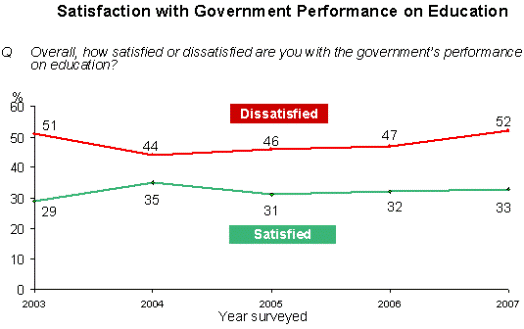Teachers Omnibus
For the first time in more than 20 years, a national walk-out by teachers went ahead in April; the largest teaching union, the National Union of Teachers called for strike action by all its members in England and Wales on 24 April, in protest at this year's pay offer from the Government. Meanwhile, the latest round of teaching union conferences (ATL, NASUWT and NUT) has seen practitioners at loggerheads with policy makers and ministers over a number of key issues including work-life balance, class sizes, Academies, pupil testing and the school leaving age.
Evidence of a growing divide between practitioners on the 'frontline' in schools, and policy makers in Whitehall, has been evident for some time in tracking data collected by Ipsos through our annual Teachers Omnibus survey. Since 2003, we've used this survey to monitor teachers' satisfaction with government performance on education, and — year-on-year — this performance has garnered more criticism than praise. In 2007, for example, just a third (33%) of survey respondents said they were satisfied with the Government's performance on education, compared with over half (52%) who expressed dissatisfaction.
Moreover, dissatisfaction has gathered momentum in the last two years, with the gap between the proportion of teachers dissatisfied and satisfied widening from 9 percentage points in 2004 to 19 points in 2007.

In helping to explain this, Ipsos's employee research indicates a strong correlation between staff morale and their involvement in the decision-making process, as well as their ability to draw attention to issues that affect them in their work. Indeed, these factors tend to exert more influence on employees' motivation than other, perhaps more obvious, factors such as pay and benefits. As such, the increasing level of dissatisfaction with the government's management of education might reflect frustration among teachers at their apparent inability to get the Government to listen. For example, the claim made recently by Schools Minister Jim Knight that class sizes of 38 and even 50+ pupils are "manageable" has been widely derided by practitioners (and by pupils and parents).
In this context, it is unsurprising that teachers report little sense of loyalty to the DCSF or the Secretary of State for Education, in sharp contrast to the high levels of loyalty to pupils and colleagues they express.
Q As a teacher, how strongly do you feel loyalty to … ?
| % Saying they feel very strong loyalty | 2007 | 2006 | 2005 |
|---|---|---|---|
| (1,000) | (999) | (1,000) | |
| % | % | % | |
| Pupils you teach | 94 | 95 | 94 |
| Your colleagues | 87 | 86 | 85 |
| Pupils' parents | 66 | 60 | 61 |
| School Leadership Team | 60 | 64 | 63 |
| Your union | 24 | 22 | 21 |
| Local Education Authority | 16 | 16 | 13 |
| DfES / DCSF | 7 | 4 | 4 |
| Secretary of State for Education | 1 | 2 | 1 |
The survey The Teachers Omnibus is an annual survey of a representative sample of 1,000 primary and secondary school teachers in England and Wales. It provides clients with cost-effective access to a robust cross-section of the profession. We can say that respondents are representative of teachers as a whole for two key reasons: firstly, we set quotas on sex, age, teaching phase and Government Office Region against the known population profile of teachers (using demographic data collated by the General Teaching Councils in England and Wales); and secondly, we use a sampling strategy which ensures that every teacher has an equal chance of taking part in the research. Also, we interview a fresh sample of teachers every time, so there is none of the respondent self-selection and "conditioning" which is often associated with panel surveys.
The Teachers Omnibus can be used for a one-off exploration of teachers' views on recent policy developments and educational 'hot topics', or of their professional attitudes, practices and experiences, but it's also ideal as a tool for tracking changes in teachers' thinking over time.
Wave 6 of the Ipsos Teachers Omnibus was conducted by telephone between 1 and 30 November 2007. Wave 7 is scheduled for Autumn 2008.



